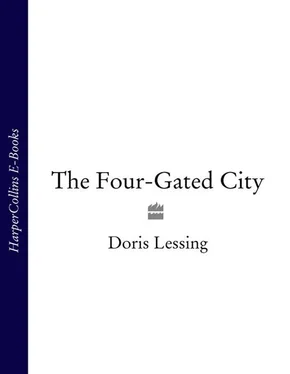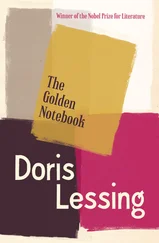The reason why Mark did not want Francis to go to his own school, the compromise progressive school where, after all, he had been happy, was that in his own mind he was a failure: or so Martha worked out was likely. Mark felt he had let his educators down; exactly as he might have felt, had he gone to Eton like his older brother James, if he had embezzled funds. His school was dedicated to emotional balance and maturity – etc. Well, he had not made that grade. If he sent Francis there, Francis would go as the son of a failure – it seemed that Mark felt something like this.
But that talk did bear fruit; for Mark went to see his mother, who came to see Martha. The meeting took place in ‘Margaret’s room’; and Margaret sat on the edge of one of her pretty chairs with her gloves in her hand, and smiled at Martha.
‘But you’ve been so good for Mark. What a pity you have to go off like this!’
‘I dare say. But I do have to.’
‘Of course. What did you say you had to do? I forget.’
To withstand this kind of accomplished insolence it was necessary to have had the kind of education Mark was now providing for Francis. To withstand it gracefully, that is. Ungracefully, Martha held out.
‘What is Mark writing at the moment?’ ‘You should ask him.’
‘Has he done any work since you’ve been here?’
‘But he always does work hard.’
‘I meant, a new book. Anyone can play about with those electric toys.’
‘I don’t think he sees them like that.’
‘Hmm. Well. I do hope you’re not going to go off when he’s in the middle of something. People will be asking if that book was just a flash in the pan.’
Knowing very well that her silence now must look like a kind of sulk – Martha kept silent.
‘Very well then. Let’s see what you’ve been doing with the basement.’
Martha was very pleased to see Margaret in the basement flat. For even when it was polished, dusted and arranged, it did not look at all like the rest of the house. It was charming; it was comfortable – and it had no life in it. For rooms to look like those upstairs, it was necessary that a person, after feeling (for months, perhaps) that there was something wrong with that chair, that table, should move it two inches, just there, where it would catch the light, just so, or stand in an exact relation to a rug, a cornice? Martha half expected that Margaret’s being in the flat, walking around it, would supply its missing quality.
But Margaret said: ‘Yes, very nice. It needs to be lived in.’ And went upstairs again.
Before leaving she said: ‘Do see that he’s not left in too much of a muddle, there’s a good girl.’
These words, so much more offensive than others she had used, were in fact the most appealing: of such importance is a tone of voice. But they missed the point of what Mark in fact needed from a ‘secretary’; what his relationship to his work was; and what Martha could contribute to it.
When Martha first came to be his ‘secretary’ and waited for typing work, something of that sort, she found that they were sitting in his study, talking. It took time for her to understand that he was trying to define his own attitudes through other people’s – hers, since here she was. Nor did she easily understand how hard it was for him to talk. He prompted and prodded her into words, listened, came back with comments, though sometimes not for days. Partly, this was a way of talking about his life: it seemed he had never had people to talk to. Not at school? Well, yes, but he had had no close friends. Not since? Well, there had been Colin.
And of course there had been Lynda and others. ‘But one doesn’t talk to the people one is in love with, does one?’ All this Martha found hard, her experience, as good as a dozen universities, having been in the talking shops of socialism.
Mark had asked Martha to read his novel; and it was typical of him that he had not expected her to have read it, and to have thought about it. He had, he said, just re-read it himself.
This novel, a short one, had been published in 1948. But it had been written in 1946, while Mark was waiting to be demobilized with the occupation forces in Austria. The book had been, as they say, widely noticed. This was because, Mark said, giving the fact without emphasis, he was a Coldridge. Exploring this (unfair! she judged it, in the face of his amusement that she should) it became clear that the literary editors, the reviewers, the people who ran the arts in England at that time, had been at school, or at university with – not Mark, but his brothers, and ‘knew’ Margaret, or at least all knew each other. No literature-fed person comes from outside Britain without expecting to find some marvellous free marketplace of the arts, internationally fed, high-minded, maintained by disinterested devotees drawn from wherever they can be found. All that excellence, the high standards – surely they were not maintained by Tom and Dick and Harry who had gone to school with Mark’s brothers and who ‘knew’ Margaret? Well, why not? Mark demanded, when he finally saw that what he took for granted, she took with incredulity. Why not? If it works?
Mark had sent the manuscript from Austria, to Jack, a friend of Colin’s, once a guest of Margaret’s: he was now a partner in a publishing firm. He had taken it for granted that the book would be ‘noticed’; would not vanish, scarcely mentioned, as do half of the novels published in Britain. No, what troubled him was the note, or tone of the reviews: cold, disliking, even hostile. He did not understand the reason for it.
‘I suppose they were hedging their bets,’ he said, scornful. ‘They never condemn a dark horse – a cowardly lot!’
One reviewer complained that the book had been written as if the war had been over a hundred years instead of in its miserable aftermath. It was fatalistic, they said. It was pessimistic, it was deterministic. It had no compassion and it was cold.
‘It’s because you aren’t indignant. You aren’t shocked.’
‘What about?’
‘Look at the writing that’s come out of this war – there isn’t much of it as yet of course. And that’s pretty unforgivable in itself – getting a novel out before the guns have even stopped firing. Positively callous!’
‘I didn’t have anything to do. None of us did.’
‘But in what has been written, there’s a note – protest. Disgust.’
‘I don’t see protest. Things happen.’
‘And the novels from the First World War, elegies for lost paradises, or anger.’
‘Well what’s the point of still feeling like that?’
‘But you ought to be able to see why other people are offended!’
The novel’s attitude was as if humanity (the earth and its people) were a variety of living organism, a body, and war was a boil breaking out on it – and could be expected to break out. It was written out of the attitude, implicit, not described, that war was bound to happen, that nothing could have prevented it, and that forms of war would erupt again. This was not at all the atmosphere of the late ‘forties when governments, politicians and the Press talked, not only as if war, the next one, was preventable, but as if the actions they were engaged in would prevent it.
But Mark saw the activities of Press, politicians, and generals as the dust games of children. As he had thrown away in a couple of paragraphs, as being too obvious to need more, throughout the ‘thirties the coming war had been organized, planned for, expected; the nations had intrigued and aligned and deployed and bargained – but the salient fact of that war, the one which had shaped it, no one had foreseen, which was that Bolshevik Russia would be fighting alongside Britain and America. This although the powerful energies of the most powerful groups in our nation and in America, had been working in the opposite direction. No need even to develop that: it was so obvious. It had not mattered what they planned, since human beings were the prisoners of events. Yet, the moment the war had worked its way to its end, as a disease runs its course, governments, generals, newspapers, again started making plans, authoritative statements, and prognostications, proving that they were incapable of seeing the most obvious fact when it was in front of their noses. They were not to be taken seriously.
Читать дальше












